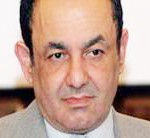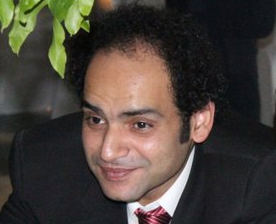Criticism of both the Supreme Council of Armed Forces (SCAF) and President Morsy have occupied a large space in Egyptian political discourse. While the SCAF and its Chairman Field Marshal Hussein Tanatwi were blamed for poorly administering the transitional period and offering the keys of the country to the Muslim Brotherhood, President Morsy is heavily criticised for the apparent delays in fulfilling his goals for the first 100 days, even regarding the traffic crisis. The criticism of Morsy extends to question the credibility of the Revival Project (Al Nahda) and its funding sources, and includes his methods of appealing to the people in his struggle for power with the military junta. In the meantime, Hillary Clinton’s visit to Egypt has raised controversies regarding Egypt’s future foreign policy, and the relationship between America and political Islamism in Egypt and the Arab region. Furthermore, analysts continue extracting historical lessons from the period between July 1952 and January 2011, as the country approaches the anniversary of the July Revolution.

The resignation of the Field Marshal
Amr Al-Shobaki
Al-Masry Al-Youm
After 18 months of loose control over state affairs, Amr Al-Shobaki questions when Field Marshal Hussein Tantawi will resign.
Despite admitting that Tantawi still represents an example of patriotism, given his success in preventing a Syrian or Iraqi scenario in Egypt and his transfer of power to a civilian leadership, Al-Shobaki deplores the political and social disturbance Egypt is currently subjected to as a result of poor administration on the part of the Supreme Council of Armed Forces (SCAF) following the ouster of Mubarak.
Al-Shobaki calls on Tantawi to respectably declare his resignation and allow the opportunity for younger generations of Egyptian army officers to step in and direct the military institution based on professional standards and not political orientation. He cannot stomach the prospect of Tantawi as a Minister of Defence in any conceivable cabinet, given the disastrous outcome of his administration as the SCAF’s Chairman, and Supreme Commander of the Armed Forces.
Criticising Tanatawi’s recent warnings to the single faction attempting to control the country, namely the Muslim Brotherhood; Al-Shobaki reminds Tantawi that his Muabarak-style policies over the past 18 months, driven by maintaining the status quo and administration rather than leadership, have opened the gates wide for political Islamism to fill the leadership vacuum.

Morsy’s revival
Mohamed Salmawi
Al-Masry Al-Youm
In an attempt to test the credibility of the Revival Project (Al Nahda) championed by President Morsy during his electoral campaign, Mohamed Salamwi discusses a recent statement made in London by the Union of Egyptians in Europe (UEE).
The statement was a comment on Morsy’s declaration during his visit to Saudi Arabia, where he announced the establishment of a bank account to receive contributions from Egyptian expatriates, in the hope to fund his Revival Project. The statement made by the UEE questioned the credibility of the feasibility studies included in Morsy’s electoral programme, which had delivered the impression that the funds for the Revival Project are available and secure.
Nevertheless, the electoral programme did not touch upon contributions by expatriate communities. The statement not only expressed the UEE’s lack of confidence regarding the feasibility studies, but also reduced Morsy’s entire project to an attempt merely to collect votes. The UEE simply stated that the policy is ‘begging’ for funds and whether from oil-rich Gulf States or from Egyptian expatriate remittances this fund raising policy will not bring success to a project whose budget exceeds 20 billion USD.
Salmawi calls upon Morsy to focus on reinstating security and ending the political turbulence as a first step prior to addressing plans for economic reform.

When will traffic police return?
Emad Al-Din Hussein
Al-Shorouk
Being used to seeing drivers disregarding traffic lights and driving on the wrong side of the road in Greater Cairo during Mubarak years, Emad Al-Din Hussein considers the alarming silence of traffic officers and conscripts facing the disorder.
An undeclared strike on the part of the traffic police has several causes, in Hussein’s estimate, the first of which being a fear of the public, who still hold bitterness and disrespect towards the police and are hardly willing to comply to any attempts to enforce law and order.
The other reason is the scarcity of resources and the harsh working conditions police officers and conscripts suffer, resulting in their lack of motivation. What raises an alarm to Hussein is that President Morsy’s promise to resolve the traffic crisis in his first 100 days of presidency remains outstanding, without any indication that current traffic conditions are to be remedied.
This will be compounded by the coming month of Ramadan and the subsequent Eid, in which traffic problems dramatically worsen. Hussein urges President Morsy to examine the status of not only the traffic police, but of the entire security apparatus and to conduct serious meetings with its heads to end their current dangerous abstention from their law-enforcing duties.

Reproach of lovers…the movie
Fahmi Howeidi
Al-Shorouk
On the occasion of the visit made by the US Secretary of State Hillary Clinton to Egypt, Fahmi Howeidi examines the outcry of the remnants of the National Democratic Party (NDP) and the supporters of Ahmed Shafiq against the American interference in Egypt’s sovereignty, and the American-Ikhwani conspiracy to destroy the country.
Howeidi suggests that this bubble created in the form of demonstrations next to the American embassy, rallies in Nasr City, and tabloid press clichés, was burst by compelling indications of the problems that lie ahead for the US Administration’s and Egypt after the rise of political Islamism.
Howeidi cites an article by Mohamed Al-Minshawi, Al-Shorouk News correspondent in Washington D.C., dated 1 July 2012. Al-Minshawi describes the criticism fired at the ‘Great Satan’s’ visit to Cairo as a political movie directed by the NDP remnants, whose motive is to blame America for betraying its Mubarakite loyalists who served its interests both internally and regionally to the maximum.

July and the January revolution
Ammar Ali Hassan
Al-Watan
On the occasion of the anniversary of the 1952 Revolution, Ammar Ali Hassan examines the progression of social and economic conditions in Egypt between July 1952 and January 2011.
Hassan praises the Free Officers of 1952 for succeeding in revolutionising Egypt’s role as a pan-Arab pioneer of liberation and independence, and accepts that their creative policies, that they achieved social justice, and that they had set plans to boost agriculture and industry in Egypt.
The 1952 Revolution dramatically redistributed the social classifications of Egypt by creating a new class of neo-technocrats along with a wider middle class. The grave fault of the Free Officers lies within their establishment of social justice at the expense of political justice which was reflected in the lack of political freedoms and the desecration of democracy.
In fact, all achievements of the July Revolution were simply eradicated by President Sadat’s decision in 1974 to implement the ‘Open Doors’ economic policy, which has planted the seeds of crony capitalism and consumerism in Egypt and effectively pulverised the broader middle class.
Furthermore, Sadat’s policies have locked Egypt in the grips of total economic dependency, and partial political dependency. This was further compounded by Mubarak systematic privatisation of public companies over two consecutive decades, until January 2011.

The superman does not fit for presidency
Wael Abdel-Fattah
Al-Tahrir
Despite Morsy’s staunch verbal battles with the Supreme Council of Armed Forces (SCAF) and its head Field Marshal Hussein Tantawi, Wael Abdel-Fattah considers these battles as cheap and outdated methods employed by the president to appeal to the people as a Superman standing against the junta.
Taking a wider look at the issue between Morsy and the SCAF, Abdel-Fattah regards the struggle as one for guardianship over the Egyptian people between the Field Marshal and the Grand Murshid.
As such, Morsy’s Superman appearance is no more than a secondary role in the narrow space separating the Marshal from the Murshid. Abdel-Fattah reiterates that the Muslim Brotherhood have fought to replace the Guardianship of Mubarak’s ousted regime with that of the Murshid.
As such, he regards their outlook on the Egyptian population as no different from the ousted National Democratic Party (NDP). While the NDP regarded Mubarak as the wise and inspiring leader, the Brotherhood hails the Murshid as the supreme guide of all the people.
Both have not yet understood that the mentality of guiding the heard has been put to an end by the 25 January Revolution and that the slaves will no longer negotiate to improve their slavery conditions, but will fight to gain their freedom.



